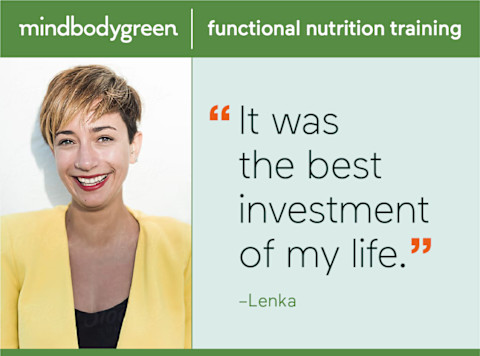3 Easy Techniques To Overcome Negative Thoughts & Rewire Your Brain

Our brains are hardwired for negativity. It's a survival mechanism—to keep us alive, our brains are constantly scanning for potential dangers. However, that negativity bias can affect your mental and physical health over time; and if you're already struggling with a chronic illness, like autoimmune disease, spiraling down a negative rabbit hole can do way more harm than good.
Take it from Eileen Laird, an autoimmune warrior and author of Healing Mindset: A Guide to the Mind-Body Connection for People With Autoimmune Disease. "It's really natural for fear, grief, and anger to surround that experience," she says on this episode of the mindbodygreen podcast. "[But] the unfortunate side effect is that it can increase the inflammation even more." All that to say: Mindfulness is an important tool for long-term healing—it's not the only tool, of course, but we can't ignore the power of the mind-body connection.
If you frequently face unhelpful thoughts, you may want to try Laird's three techniques to overcome them:
"Iffirmations"
"A technique called 'iffirmations' can be really powerful for people who struggle with affirmations," says Laird. See, affirmations can backfire depending on your personality. Some people feel very soothed by those "I am" statements, while others only feed their inner critic.
If you're unable to convince your mind of those "I am" phrases, Laird recommends changing them to "if" statements. "Put 'what if' in front of it, and it breaks through your mind's resistance and opens up possibilities," she notes. For example, if you struggle with self-worth, instead of saying, "I am worthy," try saying, "What if I am worthy?" So rather than disagreeing with you, your mind might question whether or not you are, in fact, worthy—according to Laird, this slight tweak can trick your brain into focusing on the positive.
Gratitude
"A gratitude practice can be a very simple way to literally rewire your brain," Laird adds. Again, your brain is hardwired for negativity, but rather than trying to ignore what's bad in the world (which usually backfires), gratitude helps you see the good things, too.
"I've had a gratitude practice for 10 years," Laird shares. "It's such a simple thing, just thinking of three things every night before bed that were positive and beautiful to me." Even if she was facing a flare that particular day, she could notice what was incredible in her life beyond the pain. Better yet: "[Gratitude] calms the nervous system, reduces the inflammation, and helps soothe the pain," she adds (just take a look at the research1!).
Question your thoughts.
Finally: "Questioning our thoughts is a huge part of the mind-body connection," Laird says. Essentially? Don't believe everything you think.
So when a negative thought pops up, Laird suggests asking yourself a simple question. "Let me use an autoimmune flare as an example," she shares. "The first time I have a flare, my mind will go, 'Ugh, this is never gonna end. What damage is happening to your body right now? What did you do to cause it?' It starts saying a lot of unhelpful things."
Rather than spiraling down that rabbit hole, she shifts the narrative: "I'll say to my mind, 'What helped in the past for flares to pass more quickly? What nurtured me through that process, and what made it worse?' I find that my mind likes to answer those questions; we just don't ask our minds those questions that often."
The key here is to interrupt those negative thoughts and redirect them before you believe them wholeheartedly. "[The mind's] default is negative, and so it needs to be retrained to balance that with a more positive approach."
The takeaway.
We cannot ignore the power of mindset to feel well. Of course, a positive outlook isn't the cure-all for healing, but negative thoughts can truly affect your health in a, well, negative way. While our brains are primed for the negative, a few tweaks can help give those thoughts a positive spin—and according to Laird, that's a win for your overall well-being.
Enjoy this episode! And don't forget to subscribe to our podcast on iTunes, Google Podcasts, Spotify, or Amazon Music!

